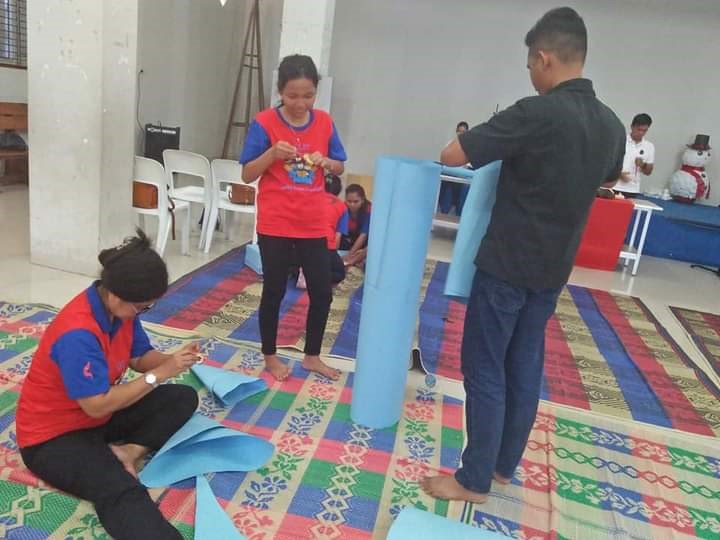PEMBEKALAN GURU SEKOLAH MINGGU DI GMI BAITHANI PLAJU, PALEMBANG, SUMATERA SELATAN
DOI:
https://doi.org/10.47457/jps.v3i3.321Keywords:
briefing, GMI Baithani, Palembang, Plaju, sunday school teachersAbstract
The development of children's knowledge in the Digital Age is accelerating. Children are now following the times so that they are not left behind. So, in children's ministry, especially in the Church, it is necessary to hold a briefing for Sunday School teachers, where teachers who teach Sunday School children are equipped with more practical ministry knowledge. If teachers update themselves, it will be easier for them to reach today's children. The Sunday School children in GMI Baithani Plaju are very active, so the teachers must be creative. Therefore, it is hoped that through this community service in the form of seminars with training accompanied by discussions of teachers and teams, Sunday School teachers will be equipped to optimize their creativity in service so that in Sunday School services, there are new things to show and make children enthusiastic in worshipping in Sunday School. This community service uses the method of seminars and discussions as well as practice to provide understanding to GMI Baithani Sunday School teachers to teach creatively and develop their creativity to foster the enthusiasm of Sunday School children in worship and ultimately strengthen children's faith.
Downloads
References
Darmawan, I Putu Ayub. Dasar-Dasar Mengajar Sekolah Minggu. Semarang: Sekolah Tinggi Teologi Simpson, 2015.
Gunarsa, S. D., and Y. S. D Gunarsa. Psikologi Perkembangan Anak Dan Remaja. Jakarta: BPK Gunung Mulia, 2017.
Helth, Stanley W. Teologi Pendidikan. Bandung: Yayasan Kalam Hidup, 2005.
Laufer, Ruth. Pedoman Pelayanan Anak. Edited by Ruth Laufer. 1st ed. Malang: YPPII Batu, 1998.
Marpaung, Dortiana. “Penerapan Metode Diskusi Dan Presentasi Untuk Meningkatkan Minat Dan Hasil Belajar Siswa Di Kelas XI IPS-1 SMA Negeri 1 Bagan Sinembah.” School Education Journal 8, no. 4 (2018).
Mulyono. Strategi Pembelajaran. Malang: UIN Maliki Press, 2012.
Naipospos, P. S. Penuntun Sekolah Minggu. Jakarta: Yayasan Komunikasi Bina Kasih, 1988.
Ruku, Galuh P. “Training Course J4C.” In Training Course J4C. 1st ed. Bekasi: Yayasan Del, 2010.
Tefbana, Ivana IT, Sarce Rien Hana, Tri Supartini, and Hengki Wijaya. “Kompetensi Guru Sekolah Minggu Terhadap Keefektifan Mengajar Anak: Suatu Studi Kuantitatif Di Jemaat GPdI El-Shaddai Makassar.” DIDACHE: Journal Christian Education 1, no. 2 (2020): 205–221.
Wardhani, Dessy Ari, and Andrias Pujiono. “Pengaruh Tingkat Pendidikan Formal Terhadap Kompetensi Mengajar Guru Sekolah Minggu.” Discreet: Journal Didache of Christian Education 2, no. 1 (2022): 10–21.
Wiyono, Bambang Budi, Kusmintardjo, and Ahmad Supriyanto. “GRANDDESIGNMODEL PEMBINAAN PROFESIONAL GURU BERBASIS DETERMINAN KINERJA GURU.” Jurnal Ilmu Pendidikan (JIP) 20, no. 2 (2014): 165–175.
Yusuf, Bistari Basuni. “Konsep Dan Indikator Pembelajaran Efektif.” Jurnal Kajian Pembelajaran dan Keilmuan 1, no. 2 (2018): 13–20.

Downloads
Published
How to Cite
Issue
Section
License
Copyright (c) 2022 Jurnal PKM Setiadharma

This work is licensed under a Creative Commons Attribution-ShareAlike 4.0 International License.
Authors who publish with this journal agree to the following terms:
- Authors retain copyright and grant the journal right of first publication with the work simultaneously licensed under a Creative Commons Attribution License that allows others to share the work with an acknowledgement of the work's authorship and initial publication in this journal.
- Authors are able to enter into separate, additional contractual arrangements for the non-exclusive distribution of the journal's published version of the work (e.g., post it to an institutional repository or publish it in a book), with an acknowledgement of its initial publication in this journal.
- Authors are permitted and encouraged to post their work online (e.g., in institutional repositories or on their website) prior to and during the submission process, as it can lead to productive exchanges, as well as earlier and greater citation of published work (See The Effect of Open Access).











